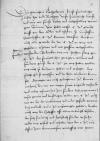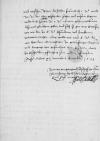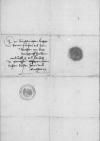List #5398
Ioannes DANTISCUS do Albrecht I von Hohenzollern-AnsbachLöbau (Lubawa), 1533-12-12
Rękopiśmienne podstawy źródłowe:
Pomocnicze podstawy źródłowe:
Publikacje:
| ||||||||
Tekst + aparat krytyczny + komentarz Zwykły tekst Tekst + komentarz Tekst + aparat krytyczny
 GStA, PK, HBA, C 2, No 54, f. 2v
GStA, PK, HBA, C 2, No 54, f. 2v
Dem durchlauchten, hochgebornen fursten und hern, / hern paper damaged⌈[hern]hern paper damaged⌉[1]
 GStA, PK, HBA, C 2, No 54, f. 1r
GStA, PK, HBA, C 2, No 54, f. 1r
Durchlauchter, hochgeborner furst, freuntlicher, liber her und nachpar. / Unser freuntliche dienst / und was wir sunst liebs und wolgefallens vormugenn, zuvoran. /
Wir haben negst E(wer) Ir(barkei)t gloubs briff von dem edlen und vhesten h(ern)  GStA, PK, HBA, C 2, No 54, f. 1v und vorsthen. / Bitten derhalben freuntlich, E(wer) Ir(barkei)t wolde im in den oben geschriben sachen und unsern begeren / widerumb, / so wie superinscribed⌈wiewie superinscribed⌉ wir in E(wer) Ir(barkei)t nhamen gethon, / volko(m)men disz mol gloubenn geben / und sich so gen uns beweisen, / wie wir dan zw E(wer) Ir(barkei)t besunderen und starckenn vortrawen tragen. / Das wolle wir umb E(wer) Ir(barkei)t, die wir Gote dem allemechtigen in gelugseliger regiru(n)g und langweriger gesuntheit thun befhelen, / alweg zw beschulden pflichtig sein. /
GStA, PK, HBA, C 2, No 54, f. 1v und vorsthen. / Bitten derhalben freuntlich, E(wer) Ir(barkei)t wolde im in den oben geschriben sachen und unsern begeren / widerumb, / so wie superinscribed⌈wiewie superinscribed⌉ wir in E(wer) Ir(barkei)t nhamen gethon, / volko(m)men disz mol gloubenn geben / und sich so gen uns beweisen, / wie wir dan zw E(wer) Ir(barkei)t besunderen und starckenn vortrawen tragen. / Das wolle wir umb E(wer) Ir(barkei)t, die wir Gote dem allemechtigen in gelugseliger regiru(n)g und langweriger gesuntheit thun befhelen, / alweg zw beschulden pflichtig sein. /
Dat(um) uff unserm slosse


